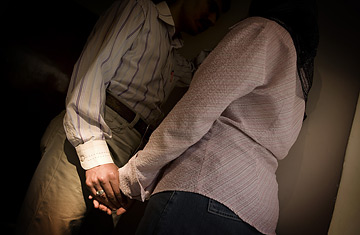
A couple steals a moment at a friend's home in Baghdad.
This is a typical Baghdad love story. Sameera Ubaid had a temp job last summer, supervising examinations at an engineering college. In the exam hall one day, she met Salaam Ali, a lecturer at the college. They made small talk while ensuring that the students didn't cheat. When the exams ended, they went their separate ways, promising to call but, Ali says, "never expecting to see each other again."
Ubaid, 28, returned to her home in Dora, a notoriously violent Baghdad neighborhood, where U.S. and Iraqi forces fight fierce daily battles against Sunni insurgents. As the fighting escalated, her family deemed it too dangerous for her to leave the house. Lonely, she began calling Ali, 32, for the occasional chat; these soon became daily conversations and then blossomed into love. Since neither has a landline, their romance was conducted entirely by cell phone, with Ali spending a third of his $250 monthly salary on phone cards. Meeting was not an option. Though they are both Sunnis, he comes from a predominantly Shi'ite tribe, which might make him guilty by association in the eyes of the fanatics who control the streets of Dora. (The names of several people in this story have been changed at their request to protect their identities.) When Ali proposed last fall, they had still not seen each other since the encounter in the exam hall. "I had not seen him in four months, but I knew I was making the right choice," says Ubaid. Since their engagement, they have met on just four occasions, and Ali says they are resigned to remaining "engaged on the cell phone" for months, even years, before they can wed. As for many couples in Baghdad these days, a face-to-face meeting is a luxury, not a necessity.
Romance was never the norm in Iraq, a conservative Muslim society in which arranged marriages are common. But before the war, in big cities like Baghdad and Basra, and especially on their university campuses, young Iraqis could have romantic liaisons and aspire to marry for love, even if that meant crossing the sectarian divide. Among the educated classes, Shi'ite-Sunni unions were not frowned upon. It was even possible to date: in Baghdad, courting couples, often accompanied by a chaperone, would meet at fruit-juice kiosks or ice-cream parlors or in one of the restaurants along the banks of the Tigris. Premarital sex was rare, but the more adventurous lovers would arrange trysts in the city's quiet nooks. One popular spot was a concrete expanse near the Jadhariya bridge sometimes used by driving instructors; there, under the pretense of teaching his girlfriend to use a stick shift, a young man could furtively hold her hand.
But the violence that has racked Baghdad since the fall of Saddam Hussein has made all that impossible. Many young people say it's just inappropriate to think of love at a time like this. "Sometimes I wish there was love in my life, but then I feel guilty," says Muna Hussein, 20, a Kurd who works as a translator in the Green Zone. "I feel I am a bad person for wanting romance for myself when my country is bleeding."
Those still seeking love have fewer places to find it. Many once liberal university campuses are now policed by fanatical Shi'ite student groups associated with the hard-line cleric Muqtada al-Sadr. They impose strict segregation of the sexes and beat up those who dare to fraternize. Parents concerned about the violence in the streets force their children, especially daughters, to remain indoors. Only the bravest go out for dinner, since restaurants are popular targets for suicide bombers. The lovers' lane near the Jadhariya bridge is marked by the burned and twisted remains of two car bombs; a police checkpoint ensures there is no loitering. Like Ubaid and Ali, many young couples have to conduct their relationships on the phone.
